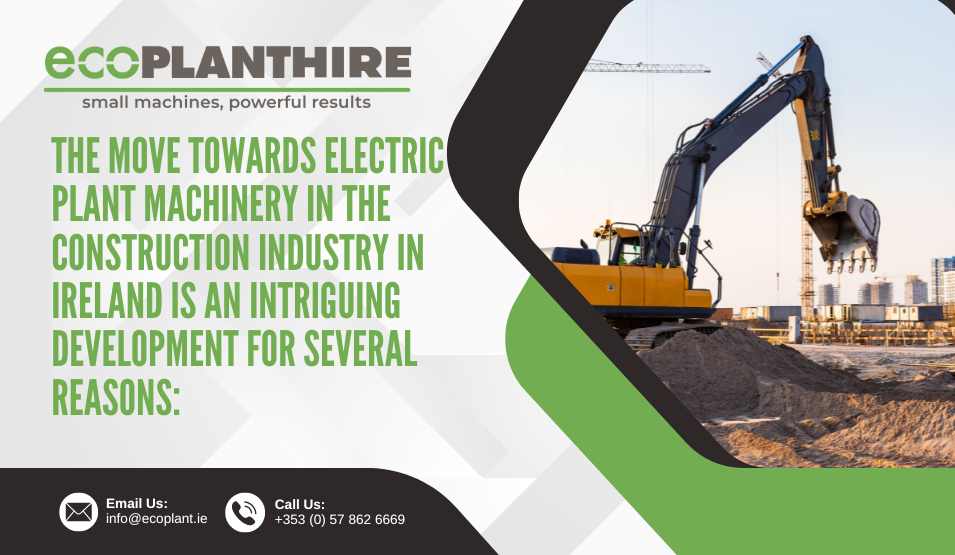Environmental Impact: Ireland, like many countries, is increasingly focused on reducing carbon emissions and mitigating climate change. Electric plant machinery offers a cleaner alternative to traditional diesel-powered equipment, thus aligning with the country’s environmental goals.
Government Initiatives: The Irish government has been implementing policies to promote the adoption of electric vehicles (EVs) across various sectors, including construction. These initiatives may include subsidies, tax incentives, or regulatory measures to encourage the use of electric plant machinery.
Cost Savings: While the upfront cost of electric machinery may be higher than conventional diesel equipment, the long-term operational savings can be significant. Electric machinery typically has lower fuel and maintenance costs, leading to overall cost savings for construction companies over the lifespan of the equipment.
Noise Reduction: Electric plant machinery tends to be quieter than diesel-powered counterparts. This can be particularly beneficial for construction projects in urban areas or sensitive environments where noise pollution is a concern.
Technology Advancements: The rapid advancement of battery technology has led to the development of more efficient and powerful batteries, extending the range and capabilities of electric plant machinery. This makes them more viable for a wider range of construction applications.
Market Demand: There is a growing demand from clients and stakeholders for sustainable construction practices. Using electric plant machinery allows construction companies to meet these demands and differentiate themselves in the market.
Health and Safety: Electric machinery eliminates the emissions of harmful pollutants such as particulate matter and nitrogen oxides, improving air quality at construction sites and promoting better health and safety conditions for workers.
Infrastructure Development: The shift towards electric plant machinery in Ireland is also driving investment in charging infrastructure. This infrastructure not only supports the adoption of electric vehicles but also benefits other sectors, such as logistics and public transportation.
Overall, the move towards electric plant machinery in the construction industry in Ireland represents a significant step towards achieving sustainability goals, improving efficiency, and addressing environmental challenges. As technology continues to advance and awareness of the benefits grows, this trend is likely to accelerate further in the coming years.
One of the notable instances for the Irish government’s initiatives to promote the adoption of electric vehicles (EVs) across various sectors, including construction, can be found in the National Development Plan (NDP) and Climate Action Plan (CAP). These documents outline the government’s strategies and targets for transitioning to a low-carbon economy and reducing greenhouse gas emissions.
The NDP, typically published every few years, sets out the government’s long-term investment priorities for infrastructure and development projects. The latest NDP, covering the period 2021-2030, includes provisions for promoting sustainable transportation, which encompasses initiatives to support the adoption of electric vehicles in different sectors, including construction.
Similarly, the Climate Action Plan outlines specific measures and policies aimed at reducing Ireland’s carbon footprint and transitioning to renewable energy sources. This plan often includes targets for increasing the uptake of electric vehicles and supporting infrastructure development, which indirectly benefits the construction industry through the promotion of electric plant machinery.

